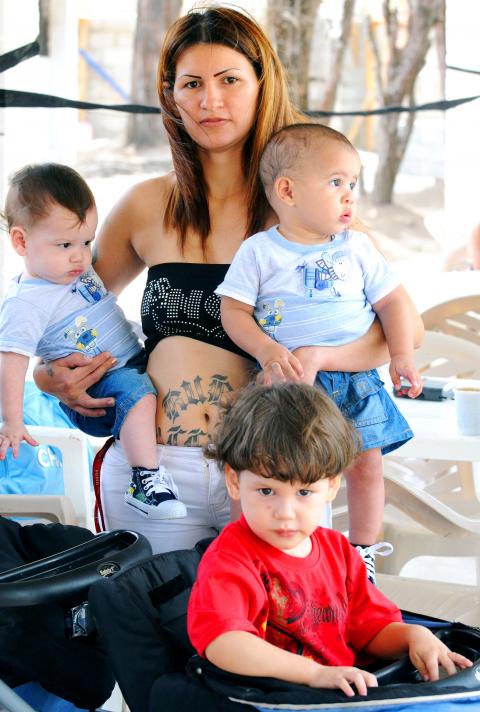“Would you still have children if you were given a second chance?” About 24 percent of the mothers that participated in a recent survey answered “no” when asked this question, and the less happy a mother was, the more likely she was to say “no.”
Mother’s Day was just around the corner when Chao Tien-lin, a Democratic Progressive Party (DPP) candidate to the legislature, and Greater Kaohsiung City Councilor Chen Hsin-yu published the results of the survey on April 25. The survey was conducted between April 19 and 21 by telephone, interviewing 1,344 mothers from various cities and counties throughout the nation.
Among the interviewed mothers, 67 percent of them believed they were “happy as a mother,” while 16 percent were “unhappy as a mother,” and 15 percent were “equally happy and unhappy as a mother.”

Photo: AFP
照片:法新社
Distinguishing between different age groups, the younger the mother was the happier she tended to be as a mother. Geographically, an average of 70 percent of mothers living in Taipei City, New Taipei City and Keelung City, as well as Taoyuan, Hsinchu and Miaoli counties were “happy” as mothers, which was a far higher percentage than other areas across the nation.
Twenty-four percent of the interviewees said “no” when asked “Would you still have children if you were given a second chance?” As many as 48 percent of the “unhappy” mothers answered “no” while 15 percent of the “happy” mothers also gave a negative response.
Among the mothers who answered “no,” 37 percent of them said that the decision would ease their economic burden, while 29 percent said raising a child was too “difficult,” and 16 percent said it was because they desired a “less restriced lifestyle.” Meanwhile, five percent of them were concerned that they would not be able to endure the pain of losing their child in the future. Chao Tien-lin said that a heavy economic burden and feeling exhausted that comes with taking care of a child are the main factors influencing a mother’s decision about having children.
(LIBERTY TIMES, TRANSLATED BY TAIJING WU)
「重新選擇,會不會生小孩?」民調顯示約有百分之二十四的母親回答「不會」,且越不快樂的母親回答「不會」的比率越高。
母親節前夕,民進黨立委參選人趙天麟與高雄市議員陳信瑜上週一公布民調,該民調於四月十九日至二十一日進行電話訪問,有效樣本為一千三百四十四名全國各縣市母親。
百分之六十七的受訪母親覺得「當媽媽快樂比較多」、百分之十六認為「不快樂比較多」、百分之十五認為「快樂與不快樂皆有」。
以年齡層區分,年紀越輕的母親認為快樂的比率越高;若以地區區分,北北基與桃竹苗的母親快樂比率較高,平均達百分之七十。
問到「重新選擇,會不會生小孩?」高達百分之二十四的母親選擇「不會」,其中覺得不快樂的母親回答「不會」比率高達百分之四十八,即使自認為快樂的母親,也有百分之十五選擇「不會」生小孩。
在回答「不會」生小孩的母親中,百分之三十七的母親認為經濟負擔可降低、百分之二十九覺得養孩子辛苦、百分之十六認為生活會比較自在、百分之五則擔心會承受失去小孩的痛苦。趙天麟指出,沉重的經濟壓力與精疲力竭照顧是母親選擇會不會生小孩的主因。
(自由時報記者侯承旭)

A: Hey, didn’t you go to the opening of the Mitsui Shopping Park LaLaport Nangang last week? B: Yeah, there are about 300 shops, including the first overseas branch of Japan’s Mahou Dokoro — a famous Harry Potter-themed store. A: Wow, I’ve always wanted to get a magic wand. B: There are also a bunch of great restaurants, such as Smart Fish hotpot restaurant. A: I wish I had Harry Potter’s “apparition” and “disapparition” magic, so I could teleport to the mall right now. A: 你上週不是有去LaLaport南港的盛大開幕嗎?有什麼特別的? B: 那裡有多達300家專櫃,包括魔法之地的海外首店——它可是日本知名的《哈利波特》專賣店。 A: 哇我一直想買根魔杖。 B: 另外還有各式各樣的美食,像是林聰明沙鍋魚頭。 A: 真希望我也有哈利波特的「現影術/消影術」魔法,能瞬間移動到商場去! (By Eddy Chang, Taipei Times/台北時報張迪)

When it comes to movies, some people delight in watching spine-chilling horror films. Surprisingly, apart from containing a few scares, horror movies may also offer an unexpected __1__. According to a study, watching 90 minutes of a scary movie can burn an average of 113 calories, which is roughly __2__ to taking a 30-minute walk. Researchers from the University of Westminster carried out an experiment in which they __3__ participants’ oxygen intake, carbon dioxide output, and heart rates while they were watching horror movies without any distractions. The results revealed that physiological responses to fear play a crucial role

Dos & Don’ts — 想想看,這句話英語該怎麼說? 1. 你覺得這部電影怎樣? ˇ What do you think of the movie? χ How do you like the movie? χ How do you think of the movie? 註︰What do you think of = What is your opinion of。 think 的受詞是 what,不能用 how。 2. 你認為哪一個歌星唱得最好? ˇ Which singer do you think is the best? χ Do you think which singer is the best? 註︰英語中 which singer 似乎是 do you think 的受詞,實則 do you think 是插入語,其他例子如下: 你以為他喜歡誰? Who do you think he likes? 你以為我住在哪裏? Where do you think I live? 你想我昨天在公園裏碰到了誰? Whom/Who do you think I met in the park yesterday? 3. 他不論到什麼地方,總是帶著一把雨傘。 ˇ No matter where he goes, he

More detailed findings showed that films with sudden, unexpected moments, called jump scares, are particularly __7__ in getting the heart racing. Interestingly, The Shining doesn’t rely on traditional jump scares to keep viewers on edge. Instead, the movie’s slow-building tension __8__ them psychologically. The dread that builds throughout the film leads to a __9__ state of alertness, which increases adrenaline production and results in a high level of calorie burn. While this research gives an interesting look at horror films as a calorie-burning activity, they are not a __10__ for regular physical exercise. Experts also warn that those with